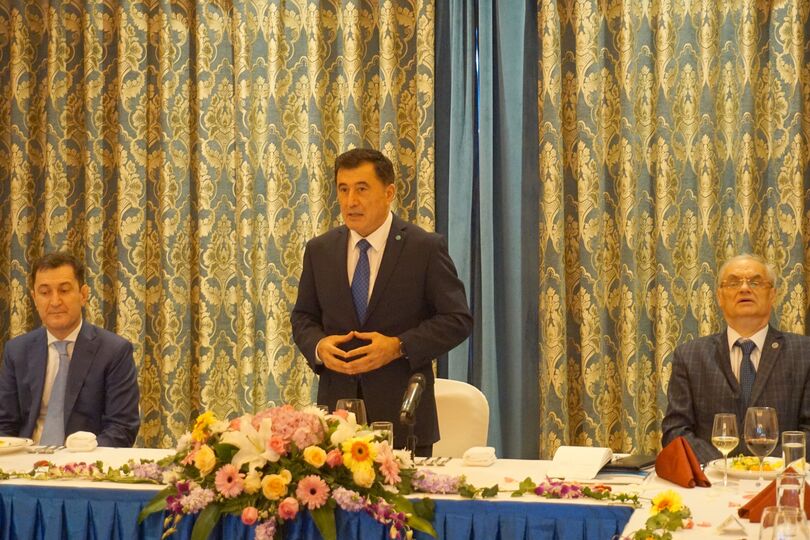On 11 November 2019, SCO Secretary-General Vladimir Norov met at the SCO Secretariat with the heads of the diplomatic missions of the SCO observer states and dialogue partners accredited in China.
The audience included the Ambassadors Extraordinary and Plenipotentiary of the Republic of Belarus, the Islamic Republic of Iran, the Republic of Azerbaijan, the Republic of Armenia and the Republic of Turkey, the Charge d'Affaires of the Islamic Republic of Afghanistan and the Minister-Counsellor of the Embassy of the Federal Democratic Republic of Nepal, as well as diplomats from Mongolia and Sri Lanka.
The meeting was held to discuss ways to stimulate practical ties in the context of the roadmap for the development of interaction between the SCO Secretariat and observer states and dialogue partners adopted in May 2019 and the outcome of the SCO Heads of Government (Prime Ministers) Council meeting held in Tashkent (1-2 November 2019).
The SCO Secretary-General noted that "the joint efforts of the observer states and dialogue partners within the framework of the SCO have a long history. The provisions regulating cooperation for the observer states and dialogue partners came into force in 2004 and 2008, respectively. The development of cooperation with these countries is outlined in the SCO Development Strategy until 2025."
Vladimir Norov pointed out that the heads of state and government from the observer states regularly attend the meetings of the SCO Heads of State Council
and the SCO Heads of Government Council, where they have put forth a number of interesting proposals and ideas. For example, the President of Belarus advanced the initiative to create an IT ecosystem in the SCO at the Bishkek summit (June 2019). The idea is to combine the capabilities of electronic media, social networks and e-commerce to enhance the competitiveness of the SCO economies in the global digital market. The Deputy Prime Minister of Mongolia reported to a recent Heads of Government Council meeting in Tashkent on the implementation of projects to modernise the country's railway lines and to build an express motorway, power lines and a gas pipeline across Mongolia within the framework of the Russia-Mongolia-China economic corridor. He also said Mongolia was preparing to host an extraordinary meeting of the SCO Business Council, to be attended by mining, energy and agriculture experts, in 2021. "Taken together, this is evidence of the partners' interest in SCO activities," the SCO Secretary-General noted.
It was pointed out at the meeting that the SCO countries are focused on the development of cooperation in customs, science and technology, agriculture and ICT. Vladimir Norov recalled that early each year the SCO Secretariat sends a list of SCO events to the observer states and dialogue partners so they can send their representatives to the events of interest to them.
It was noted at the meeting that many of the SCO's international treaties, including the SCO Agreement on Facilitation of International Road Transport, are open to any country for signature.
The high-ranking diplomats attending the meeting welcomed the SCO Secretariat's initiative for promoting interaction with the observer states and dialogue partners. They pointed out the importance of receiving first-hand information on SCO activities.
Azerbaijani Ambassador Akram Zeynalli spoke out in support of the statement made by the SCO Secretary-General. He noted that Azerbaijan intended to continue to work actively within the SCO and invited the SCO countries to attend international events in Azerbaijan, which has many attractive tourist landmarks and is willing to open its doors to tourists from the SCO countries. The Ambassador also spoke about the importance of cultural and humanitarian cooperation, including festivals and exhibitions held jointly with the SCO Secretariat.
Belarusian Ambassador to China Kirill Rudy pointed out that the SCO was an important international organisation and a shining example of neighbourly relations between widely different ethnic groups. He also expressed interest in the development of modern information technology, called for promoting information on SCO activities and stressed the importance of holding cultural festivals beyond the SCO space.
The Turkish Ambassador proposed joining efforts to implement national and international projects aimed at settling regional problems.
Iranian Ambassador Mohammad Keshavarz-Zadeh said the SCO countries had common roots and that this fact should become the basis for the creation of common transport networks in the SCO space.
The Minister-Counsellor of the Nepalese Embassy stressed the importance of joining efforts on environmental matters.
Many heads of diplomatic missions expressed great interest in the Model SCO interactive educational games for school and university students and asked if their countries could join this programme.
At the conclusion of the meeting, SCO Secretary-General Vladimir Norov reminded those present about the upcoming fourth SCO Kunming Marathon on 1 December and urged everyone to take an active part in this sports and cultural event.
